
ACTA HAEMATOLOGICA
Scope & Guideline
Illuminating the Path of Hematological Discoveries
Introduction
Aims and Scopes
- Clinical Research in Hematology:
The journal emphasizes clinical studies focusing on patient outcomes, treatment efficacy, and safety in various hematological disorders such as leukemia, lymphoma, and myeloma. - Transplantation and Cellular Therapies:
A significant portion of the published research addresses allogeneic and autologous stem cell transplantation, including conditioning regimens, graft-versus-host disease, and post-transplant complications. - Molecular and Genetic Studies:
The journal features research on the molecular mechanisms underlying hematological malignancies, including genetic mutations, biomarkers, and their prognostic implications. - Innovative Therapeutic Approaches:
ACTA HAEMATOLOGICA highlights advancements in therapeutic strategies, including novel drug therapies, immunotherapy, and combination treatments, with a focus on improving patient care. - Patient-Centered Outcomes:
Research addressing quality of life, psychological impact, and patient-reported outcomes in hematological conditions is a core area of interest, reflecting a holistic approach to treatment.
Trending and Emerging
- Immunotherapy and Targeted Treatments:
There is a growing emphasis on immunotherapeutic approaches and targeted therapies, such as CAR-T cell therapy and novel monoclonal antibodies, which are revolutionizing treatment for hematological malignancies. - COVID-19 Impact on Hematology:
Research exploring the effects of COVID-19 on hematology patients, including treatment adaptations and outcomes, has surged, highlighting the intersection of infectious disease and hematological care. - Longitudinal and Real-World Data Studies:
The journal is increasingly publishing longitudinal studies and real-world evidence that assess treatment effectiveness and patient outcomes over time, providing valuable insights into clinical practice. - Patient Quality of Life and Psychosocial Factors:
Emerging themes include the exploration of quality of life and psychosocial factors affecting patients with hematological disorders, emphasizing a patient-centered approach to care. - Genetic and Biomarker Research:
There is a significant rise in studies focusing on genetic profiling and biomarkers that aid in prognosis and treatment selection, reflecting the trend towards personalized medicine in hematology.
Declining or Waning
- Traditional Chemotherapy Protocols:
Research focusing on conventional chemotherapy regimens has decreased, possibly due to the rising interest in targeted therapies and personalized medicine. - Basic Science without Clinical Application:
There has been a noticeable decline in purely laboratory-based studies that do not translate into clinical practice, as the journal shifts towards research that directly impacts patient care. - Case Reports and Isolated Incidents:
The publication of singular case reports has diminished, indicating a trend toward more comprehensive studies and larger cohort analyses that provide stronger evidence for clinical practices. - Non-Hematological Comorbidities:
Research on non-hematological conditions in patients with blood disorders has receded, reflecting a focus on hematological-specific issues and treatments in recent publications.
Similar Journals

BLOOD REVIEWS
Empowering research, transforming blood health.BLOOD REVIEWS is a highly regarded journal published by Churchill Livingstone, specializing in the fields of Hematology and Oncology. With an impressive Q1 ranking in both disciplines and placing in the top 10% of its peer categories according to Scopus metrics, it provides an essential platform for the dissemination of cutting-edge research and reviews pertaining to blood disorders and cancer treatment. Since its inception in 1987 and continuing through 2024, the journal has established itself as a cornerstone for healthcare professionals, researchers, and students who seek to advance their understanding of hematologic and oncologic topics. While not an open-access journal, BLOOD REVIEWS retains a reputation for delivering high-quality, peer-reviewed articles that foster dialogue and innovation within the scientific community. For those in the United States and beyond, the journal serves as a vital resource, housed at the Journal Production Department in Edinburgh, Scotland, ensuring accessibility and a global reach in its critical academic contributions.

Transplantation and Cellular Therapy
Illuminating Pathways in Immunology and Transplantation.Transplantation and Cellular Therapy is a leading journal published by Elsevier Science Inc, dedicated to advancing the fields of transplantation, immunology, cell biology, and molecular medicine. With its ISSN of 2666-6375 and E-ISSN 2666-6367, this journal serves as a vital resource for researchers, practitioners, and students aiming to stay at the forefront of innovative therapies and clinical practices in transplantation. As of 2023, it holds an impressive Q1 ranking in multiple categories, including Cell Biology, Hematology, Immunology and Allergy, Molecular Medicine, and Transplantation, reflecting its high impact and relevance in the scientific community. The journal, operating from its base in the Netherlands, supports Open Access publishing to enhance the dissemination and accessibility of groundbreaking research. Acknowledging the significance of transplantation and cellular therapies in modern medicine, Transplantation and Cellular Therapy is poised to propel future discoveries and developments in these critical domains.
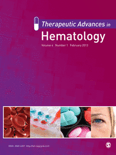
Therapeutic Advances in Hematology
Pioneering breakthroughs in blood health.Therapeutic Advances in Hematology is a prestigious, peer-reviewed journal dedicated to advancing the field of hematology through innovative research and clinical studies. Published by SAGE Publications Ltd, this journal has become a vital resource for hematology professionals and researchers since its inception in 2010. With its impactful Q1 ranking in Hematology and a Scopus rank of 62 out of 137, it firmly establishes itself as a leader in disseminating significant findings and therapeutic approaches. The journal has been committed to open access since 2019, ensuring that its cutting-edge research is readily available to the global scientific community. Covering a broad scope of topics within hematology, Therapeutic Advances in Hematology is an essential platform for those seeking to enhance their understanding and implementation of therapeutic practices in hematological conditions. The journal embraces submissions from both clinical and laboratory perspectives, fostering collaboration and dialogue among researchers, clinicians, and students alike.
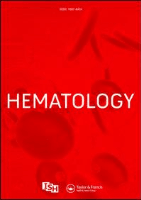
Hematology
Innovative Insights: Shaping the Future of HematologyHematology is a distinguished open-access journal published by Taylor & Francis Ltd, dedicated to advancing research and knowledge in the field of hematology. Established in 1996, the journal has continually evolved to meet the needs of a growing community of researchers and practitioners, providing a vital platform for disseminating innovative findings and clinical insights. With its impact factor reflecting a robust commitment to quality scholarship, Hematology has achieved a respectable position in its category as evidenced by its Q3 ranking in the Hematology category and ranks #85 out of 137 in the Scopus index, which positions it in the 38th percentile among its peers. The journal’s open-access policy, initiated in 2019, further enhances its reach and accessibility, allowing a broad audience of professionals, researchers, and students to engage with high-quality research without barriers. By covering a wide range of topics related to blood disorders, treatment methodologies, and emerging therapies, Hematology stands as an essential resource for those dedicated to innovation in this critical area of healthcare.

Blood and Lymphatic Cancer-Targets and Therapy
Championing Open Access for Global Cancer ResearchBlood and Lymphatic Cancer-Targets and Therapy, published by DOVE MEDICAL PRESS LTD, is a vital open-access journal that has been disseminating crucial research and findings in the field of hematology and oncology since 2011. With its ISSN 1179-9889, this journal focuses on the latest therapeutic targets and innovative treatment strategies for blood and lymphatic cancers, contributing significantly to the advancement of knowledge and practice in this specialized area. Designed for researchers, healthcare professionals, and students alike, Blood and Lymphatic Cancer-Targets and Therapy aims to foster a deeper understanding of cancer biology and promote collaborative efforts leading to novel therapeutic interventions. The open-access model ensures that research findings are readily accessible to a global audience, underscoring the journal's commitment to enhancing patient care and fostering educational growth in the cancer domain.
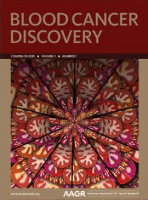
Blood Cancer Discovery
Uncovering Breakthroughs in Blood Cancer ScienceBlood Cancer Discovery is a premier academic journal published by the American Association for Cancer Research, dedicated to advancing the understanding of hematologic malignancies through cutting-edge research in the fields of oncology, biochemistry, and molecular biology. With an impressive impact factor and recognition as a Q1 journal across multiple disciplines, including cancer research and hematology, Blood Cancer Discovery serves as an essential platform for scholars and practitioners alike, facilitating impactful discourse and dissemination of pioneering findings. This open-access journal, established within the vibrant academic landscape of the United States, aims to bridge gaps in research and foster collaborations to ultimately enhance patient outcomes. Its Scopus rankings demonstrate its vital role in the critical advancement of cancer research and therapeutic development. By inviting contributions from a diverse range of disciplines, Blood Cancer Discovery is poised to drive innovation and inspire future advancements in understanding blood cancers.

INTERNATIONAL JOURNAL OF HEMATOLOGY
Elevating Hematology Research to New HeightsThe INTERNATIONAL JOURNAL OF HEMATOLOGY, published by SPRINGER JAPAN KK, serves as a critical platform for advancing research in the field of hematology. With a prestigious history spanning over three decades from 1991 to 2024, this journal is recognized for its impactful contributions, evidenced by its Q2 category ranking in Hematology for 2023, and its notable position at rank #71 out of 137 in the Scopus Medicine Hematology category. Researchers and professionals within the hematology community benefit from the journal's rigorous peer-reviewed articles that cover a wide range of topics, including clinical studies, basic research, and novel therapeutic strategies. Though currently non-open access, it provides essential insights and findings to an audience passionate about the latest advancements in blood disorders and treatments. Situated in Japan, the journal not only showcases high-quality research but also fosters a global exchange of knowledge in hematology, making it a significant resource for scholars, practitioners, and students alike.
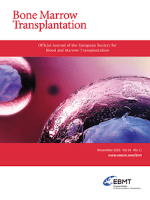
BONE MARROW TRANSPLANTATION
Connecting Researchers to Transform Transplantation Practices.BONE MARROW TRANSPLANTATION, published by SpringerNature, stands as a leading journal in the fields of Hematology and Transplantation, as evidenced by its recognition in the Q1 category for both disciplines according to 2023 rankings. With an impressive impact factor and notable Scopus rankings—7th out of 54 in Medicine Transplantation and 25th out of 137 in Medicine Hematology—this journal is instrumental for researchers and professionals dedicated to advancements in bone marrow transplantation practices and research. Established in 1986, the journal publishes original research, clinical studies, and reviews that push the boundaries of current knowledge, making it essential reading for those looking to stay abreast of the latest developments in the field. Although offering limited Open Access options, BONE MARROW TRANSPLANTATION reaches a broad audience and furthers a global dialogue on best practices and innovative approaches in transplantation medicine. Its address in London, UK positions it at the heart of international research collaboration, fostering connections among scientists, clinicians, and students alike.
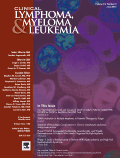
Clinical Lymphoma Myeloma & Leukemia
Transforming Cancer Care with Cutting-Edge ResearchClinical Lymphoma Myeloma & Leukemia is a prestigious journal dedicated to the study and treatment of hematologic malignancies, offering a vital platform for researchers and healthcare professionals in the fields of oncology, hematology, and cancer research. Published by CIG MEDIA GROUP, LP, this journal has established itself as a crucial resource since its inception in 2010, with a continuous commitment to disseminating knowledge until at least 2024. With an impact factor that objectively reflects its influence, it is rated in Q3 quartiles in both Cancer Research and Hematology as well as in Oncology as of 2023. Researchers can access a wealth of articles and studies that explore various dimensions of lymphoma, myeloma, and leukemia, thus fostering an environment of collaboration and innovation. Although it currently does not offer full open access, its extensive archive and rigorous peer-review process ensure the publication of high-quality research, making it an essential resource for anyone dedicated to advancing the science and practice of treating blood cancers.
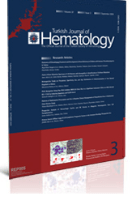
Turkish Journal of Hematology
Championing open access to vital hematology knowledge.Turkish Journal of Hematology is an esteemed publication dedicated to advancing the field of hematology, producing influential research since its inception in 1999 under the auspices of GALENOS PUBL HOUSE. With an Open Access model, it facilitates widespread dissemination of knowledge, allowing researchers, clinicians, and students to stay abreast of the latest developments in blood disorders and treatments. With an ISSN of 1300-7777 and an E-ISSN of 1308-5263, the journal holds a commendable position in the academic community, evidenced by its 2023 Q3 ranking within the hematology category and its standing at #80 out of 137 in the Scopus database, placing it in the 41st percentile. Covering a wide scope of topics within hematology, this journal serves as a critical resource for disseminating innovative research and clinical practices pertinent to the ongoing challenges faced in this vital area of medicine. With its continuous publication until 2024, Turkish Journal of Hematology remains a beacon for enhancing the understanding and treatment of hematological conditions within the Turkish and global medical communities.